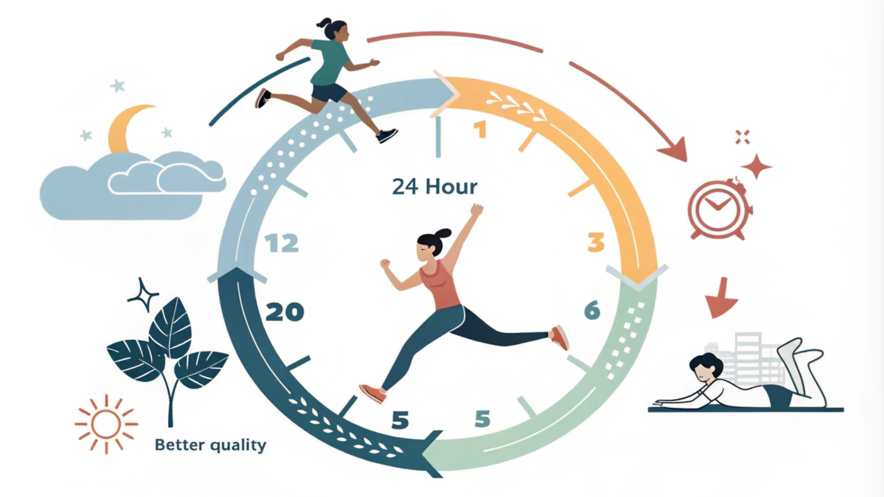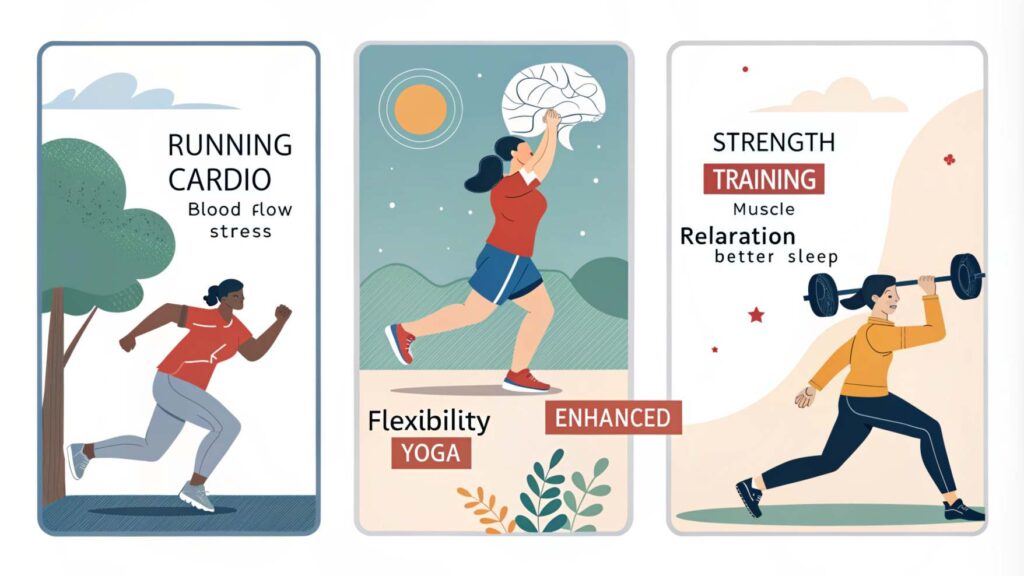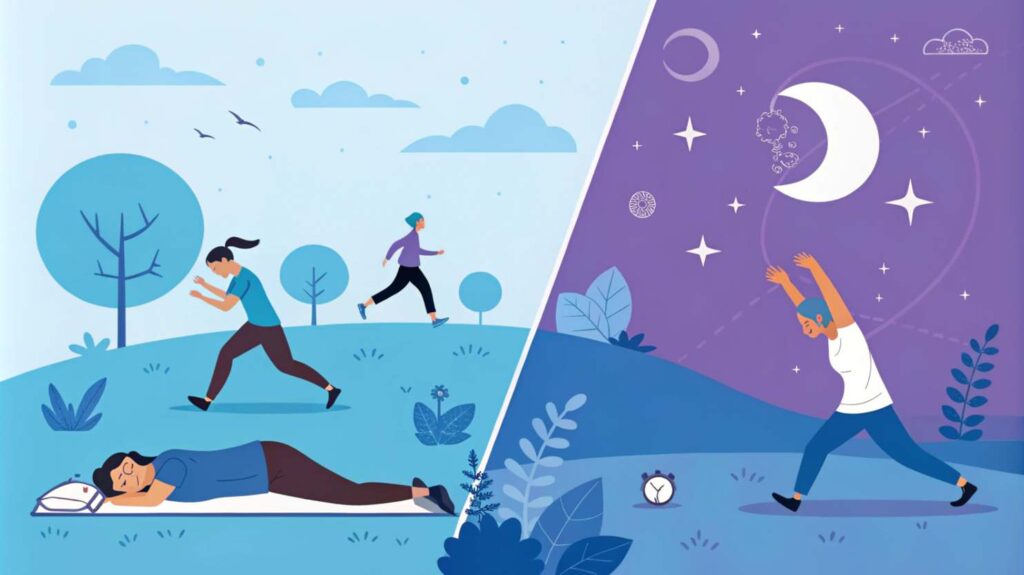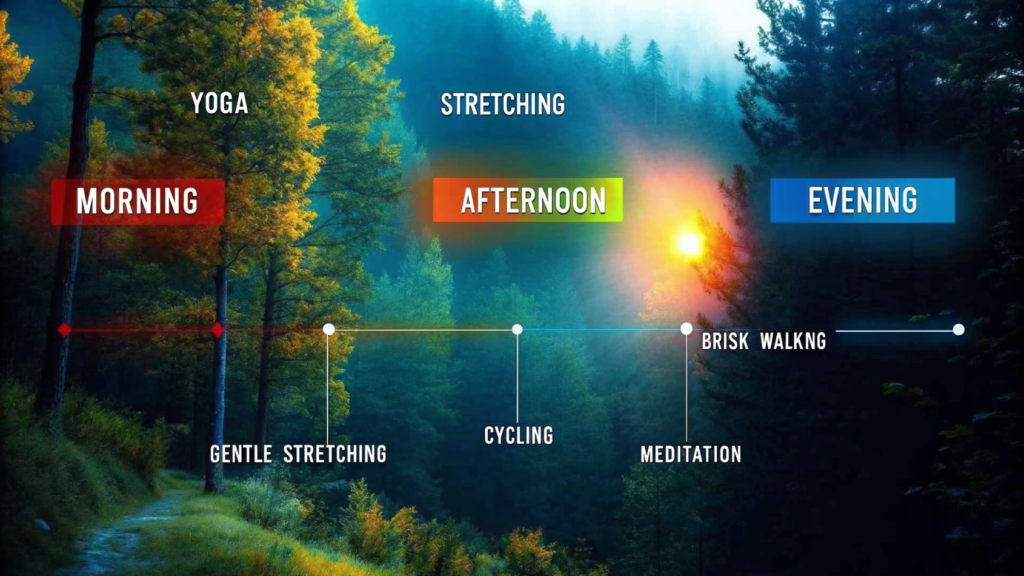Ever notice how a great workout leaves you sleeping like a baby, while days of being desk-bound have you tossing and turning? It’s not just coincidence – the connection between physical activity and quality sleep is one of nature’s most powerful yet underutilized remedies.
Whether you’re an insomniac searching for natural solutions, a fitness enthusiast looking to maximize recovery, or someone simply seeking better rest, understanding how exercise influences sleep could be the game-changer you need. Let’s explore why moving your body during the day could be the key to peaceful nights.
The Link Between Exercise and Sleep Quality
Exercise can really make a difference in how well you sleep at night. It’s helpful for folks dealing with sleep problems, health buffs, parents setting up kids’ bedtime routines, shift workers with irregular hours, and seniors facing changes in sleep patterns. Knowing how exercise and sleep interact can help develop habits that lead to peaceful nights.

Understanding the Relationship
Lots of research shows there’s a solid link between exercise and better sleep. Working out regularly not only helps you doze off quicker but also makes you sleep longer and more deeply. It increases the time spent in slow-wave sleep, crucial for body recovery. Here’s a quick look at how different types of exercise can boost sleep:
| Type of Exercise | Impact on Sleep Quality |
|---|---|
| Aerobic exercise | Boosts deep sleep and helps fall asleep quicker |
| Strength training | Extends sleep time and improves sleep quality |
| Flexibility exercises | Aids relaxation and helps wind down before bed |
“Exercise is the most underutilized antidepressant and sleep aid available.” – Dr. Mark Hyman
Benefits of Exercise on Sleep Quality
Getting active offers more than just sleep perks. Here are some plus points linked to exercise and better sleep:
- Longer Sleep: Folks who exercise regularly tend to snooze longer.
- Less Sleep Trouble: Moving your body can ease problems like insomnia and sleep apnea. Useful tips are available in resources about sleep tips.
- Better Mood and Less Stress: Exercise boosts endorphins, leading to a happier mood and less stress, which helps sleep better. Check out the 4-7-8 breathing method for more relaxation at night.
- Evened-Out Sleep Cycles: Regular exercise helps tune your body’s clock, leading to better sleep patterns. Learn more about aligning your clock with methods discussed in body clock reset.
Sticking with a workout routine can do wonders for sleep and overall health. For tips on forming good habits, have a look at our piece on smart sleep practices.

Exercise Types for Improved Sleep
Adding a mix of different exercises to your daily routine can be a game-changer for catching those Z’s. Check out these three workout picks that’ll help you snooze like a baby.
“The best exercise for sleep is the one you’ll do consistently.” – Dr. Michael Breus
Aerobic Exercise
Let’s get that heart pumping! Aerobic stuff like running, biking, and swimming isn’t just about breaking a sweat. It gets your heart rate buzzing and you’ll sleep like a log afterward.
| Activity | Duration (mins) | Frequency (per week) | Sleep Boost |
|---|---|---|---|
| Brisk Walking | 30 | 3-5 | Middle |
| Jogging | 20-30 | 3-4 | Big Time |
| Biking | 30 | 3-5 | Middle |
| Swimming | 30 | 3-5 | Big Time |
Strength Training
Want to relieve some stress? Pick up a dumbbell or use your own body weight. Strength training doesn’t just make your muscles strong—it helps melt away those worries and helps you snooze better.
| Exercise Type | Sets | Reps | Days a week | Snooze Potential |
|---|---|---|---|---|
| Weight Lifting | 3 | 8-12 | 2-3 | Middle |
| Bodyweight Moves | 3 | 10-15 | 2-3 | Middle to Big |
| Resistance Bands | 3 | 8-12 | 2-3 | Middle |
Flexibility and Balance Exercises
Stretch it out and find your zen. Yoga or some good old-fashioned stretching can help you chill out and get ready for dreamland. Try adding these to your schedule more often for better sleep.
| Exercise Type | Time (mins) | Days a week | Chill Factor |
|---|---|---|---|
| Yoga | 30 | 3-5 | High |
| Stretching | 15-20 | Daily | Middle to High |
| Tai Chi | 30 | 2-3 | High |
Mixing up the types of workouts—whether you’re pounding the pavement, lifting weights, or bending in yoga—can seriously step up your sleep game. Want more ideas on exercises and bedtime habits? Check out our take on healthy sleep habits. And don’t forget about bedtime rituals and the chill vibes of the 4-7-8 breathing technique to catch those extra Zzz’s!
Timing Your Workouts for Better Sleep
Working out at the right time can really turn your snooze game up a notch. This part of the article has a friendly face-off between morning and evening sweat sessions and how they might mess with your bedtime.
Morning vs. Evening Workouts
Getting active in the a.m. can kickstart your day and your ability to catch some quality Zs. Exercising when the sun’s waking up helps your body’s clock stick to its groove, giving you a rock-solid snooze routine.
| Time of Day | Benefits |
|---|---|
| Morning | – Boosts your mood all day – Keeps your routine steady – Jumpstarts your metabolism |
| Evening | – Great stress buster – Easier to slot into a packed day – Might help some folks chill out |
Evening warriors, listen up—if after work is your gym jam, keep in mind that heavy-duty workouts before bed might rev your engines and leave you staring at the ceiling. But don’t sweat it; working out later can help some folks shake off the day’s stress.
Considerations for Exercising Close to Bedtime
When late-night workouts are your only option, think about what and how you’re doing it.
- Intensity: Keep it mellow with a yoga sesh or gentle stretches near bedtime to help your brain dim the lights and prep for sleep.
- Duration: Stick to short and sweet sessions—like 30 to 60 minutes—to keep from getting all hyped up before you hit the hay.
- Post-Workout Routine: Wind down with a routine that whispers bedtime vibes to your body. Try out a 4-7-8 breathing technique or soak up some chill with a warm shower.
| Exercise Intensity | Suggestions |
|---|---|
| High-Intensity | Best left for more than a couple of hours before bed |
| Moderate | Perfect earlier in the evening |
| Low | Just right for winding down |
Pro tip: Create a chill evening routine to help you keep sleep on the good side. Pair it with solid lifestyle choices for a more rounded approach to battling your sleep demons. For tips, check out our guides on consistent sleep schedule and bedtime rituals.
Get your exercise timing in sync, and you might just turn bedtime from a restless battle to a peaceful slide into the land of dreams.
How Exercise Impacts Sleep
Who would’ve thought? Sweating it out during the day can actually help you sleep like a baby at night! Exercise is a friend to those tired souls looking to catch some quality Z’s, and once you understand how it shakes things up in your snooze cycle, you’re halfway to snooze-town.
Regulation of Circadian Rhythms
Let’s talk about the boss of your body clock: your circadian rhythm. This 24-hour powerhouse sorts out when you hit the hay and when you rise with the birds. Exercise is like a personal trainer for this clock, giving it a solid pep talk to keep things ticking right.
It’s not just about feeling beat after a workout. Getting your move on pumps up melatonin, the sleep hormone that throws the cue for bedtime. That way, your body knows when lights out really means lights out.
| Activity Type | Impact on Circadian Rhythm |
|---|---|
| Aerobic Exercise | Cranks up melatonin, helping you drift off |
| Strength Training | Keeps your sleep schedule steady |
| Flexibility Exercises | Chills you out, making bedtime less of a struggle |
If resetting that inner clock is on your to-do list, check out our tips on circadian rhythm reset.

Influence on Sleep Architecture
Now, let’s unravel the science term “sleep architecture” — basically, it’s all about those sleep cycles you weave through every night. Exercise can be your sleep architect, crafting the kind of night rest that leaves you recharged.
Regular workouts amp up the deep sleep stages, the VIP section of Dreamland. It’s where the real magic happens — your body recovers, and you wake up feeling like you slept on a cloud. Fewer quick wake-ups, and more solid nights.
| Sleep Stage | Effect of Exercise |
|---|---|
| Light Sleep | Less frequent when you’re getting in those steps |
| Deep Sleep | Longer and stronger with the right exercise |
| REM Sleep | Gets a bonus boost as overall sleep improves |
Want to make your sleep cycle work for you? Dive deeper into how you can sync those workouts and bedtimes with a consistent sleep schedule. It might just transform your nights and mornings!
Tips for Establishing an Exercise Routine
Crafting a workout plan can noticeably boost how well you snooze. Here’s a quick rundown to get your fitness groove going.
Setting Realistic Goals
Kicking off a new exercise gig? Start with goals you won’t quit. Think of it as keeping your spirits high and stress low. These goals can depend on what you like, how fit you are, and how busy you get.
| Goal Type | Examples |
|---|---|
| Daily Activity | Take a 30-minute walk |
| Weekly Exercise | Do three 30-minute workouts |
| Skill Development | Gain flexibility through yoga |
| Endurance Goals | Train to run a 5k in 3 months |
Chopping bigger goals into bite-sized chunks makes success more likely. Ensure your plans hang in sync with your style and stamina.
Creating a Consistent Schedule
Having a routine workout slot ups your game. Pencil it in your weekly itinerary as if it’s dinner with a friend you can’t ditch.
| Day | Activity | Time |
|---|---|---|
| Monday | Aerobic Exercise | 7:00 PM |
| Wednesday | Strength Training | 6:00 PM |
| Friday | Flexibility Class | 5:30 PM |
| Sunday | Family Walk | 10:00 AM |
A regular drill helps your body mesh with the activity vibes, making workouts feel natural. If you want ideas on sticking to a sleep routine, bounce over to our piece on building a consistent sleep schedule.
Mixing Things Up
Shake up your workout routines; it keeps things lively and works muscles you didn’t know existed. Also, waving goodbye to boredom and those stubborn plateaus.
| Type of Exercise | Examples | Frequency |
|---|---|---|
| Cardiovascular | Running, Cycling | 3 times a week |
| Strength Training | Weightlifting | 2 times a week |
| Flexibility and Balance | Yoga, Pilates | 1-2 times a week |
Diversifying workouts doesn’t just bulk up your physical game, it’s a cool mental boost too. For more intel on upping your activity game, check out our guide on sleep-improving routines for beginners.
Tossing these into your workout toolkit can help you sleep, smile, and thrive. This method isn’t just good for your shut-eye; it’s an all-around life enhancer.

Complementing Exercise with Other Sleep Practices
Getting good sleep isn’t just about breaking a sweat. By blending other sleep-boosting habits into your day, anyone can catch those quality Z’s. This section dives into leading a sleep-friendly life and tackling stress and anxiety.
Maintaining a Sleep-Healthy Lifestyle
Treat sleep like you treat your favorite pizza: give it all the right toppings. A few simple choices in life can do wonders—here’s how:
| Lifestyle Component | What It’s About |
|---|---|
| Diet | Munching on a well-balanced diet loaded with vitamins and minerals can seriously up your sleep game. Snacks like nuts, fish, and whole grains are the dream team. |
| Hydration | Sipping on enough water during the day is key to quality sleep. But, guzzling gallons before bed? Not so smart unless midnight bathroom trips are your thing. |
| Caffeine Intake | Cut back on caffeine as the sun sets. Your future sleepy self will thank you. |
| Screen Time | Power down those screens at least an hour before hitting the hay. Bye-bye blue light, hello sleep! Check out our tips on digital detox for sleep. |
Adding a chill routine before you doze off—like reading or peaceful tunes—can wrap up a solid sleep package. Need more on that? Peep our piece on bedtime rituals.
Managing Stress and Anxiety
Stress and anxiety can sabotage good sleep like an unexpected plot twist. Here’s how to keep the drama out of your dreams:
| Stress Busters | What’s in the Mix |
|---|---|
| Deep Breathing | Try the 4-7-8 breathing trick to mellow out and kiss anxiety goodbye. |
| Meditation | Zen’s the name of the game. Regular meditation can chill your mind, making it easier to drift off. Give mindfulness apps a whirl—they’re worth it. |
| Sleep Journaling | Jotting down your sleep saga helps spot those sneaky stress culprits. Check out more on sleep journaling. |
| Regular Exercise | Exercise isn’t just for your waistline; it’s also a stress-buster. Pair it with relaxing moments for even better sleeps. |
Mixing these habits with your workout routine can pave the path to sleepytime success, helping you wake up fresher than ever. For more routine know-how, swing by our guide on maintaining a consistent sleep schedule.
Seeking Professional Advice
If you can count more sheep than you can nights of good sleep, it might be time to get some professional advice. Healthcare folks and fitness gurus can share strategies to tackle those pesky sleep challenges like a pro.
Consulting a Healthcare Provider
Do sleep troubles stick around longer than your leftover Thanksgiving turkey? A visit to your healthcare provider could be the ticket. They’ll help spot if something like sleep apnea, restless legs, or anxiety is keeping you up at night and suggest how to handle it.
Sometimes, they’ll even get you to slide a bit of exercise into the mix. A few stretches here, a jog there, and maybe some herbal teas and deep breaths before bed—all in the name of better sleep.
| Sleep Busters | What Might Help |
|---|---|
| Insomnia | Cognitive Behavioral Therapy for Insomnia (CBT-I) |
| Sleep Apnea | CPAP therapy and lifestyle shifts |
| Restless Leg Syndrome | Meds and stretching |
Working with a Fitness Trainer
Got a fitness trainer in your corner? They’ll sort you out with a workout plan that’s just right for catching those Zs. They’ll include exercises to relax you and make you feel good all-round. Plus, they’ll let you in on which exercises have a direct line to boosting exercise and sleep quality.
Fitness trainers are great at setting goals you won’t need a magic wand to achieve, keeping you on track, and showing you the ropes so you won’t hurt yourself—perfect if you’re a senior or have health stuff going on. They’ll make exercise your new BFF, which is a big win for sleep.
| Why You’ll Love a Fitness Trainer | What They Focus On |
|---|---|
| Customized workouts | Sleep-boosting exercises |
| Someone to keep you honest | Regular exercise times |
| Lessons on moving right | Safe moves for everyone |
Mixing healthcare smarts and fitness advice can be your best bet for turning things around. Dive into sleep hygiene tips, and try out bedtime rituals for a recipe that’s sure to whip your sleep back into shape.
Conclusion
The relationship between exercise and sleep is more than just burning energy to earn rest – it’s a sophisticated dance of hormones, circadian rhythms, and physical recovery. By understanding when, how, and what type of exercise best supports your sleep goals, you can craft a routine that enhances both your fitness and your rest. Remember, the perfect exercise routine for sleep isn’t about exhausting yourself; it’s about finding the right balance of activity, timing, and consistency that works for your lifestyle. Whether you’re a morning jogger or an evening yogi, the path to better sleep might just start with lacing up those sneakers.
FAQs
How long before bed should I stop exercising?
Aim to finish vigorous exercise at least 2-3 hours before bedtime. Light stretching or yoga can be done closer to bedtime as they help relaxation.
What type of exercise is best for sleep?
Moderate aerobic exercise like walking, swimming, or cycling shows the strongest sleep benefits. However, any consistent physical activity is beneficial.
How much exercise do I need for better sleep?
Aim for 150 minutes of moderate exercise or 75 minutes of vigorous exercise weekly. Even 10-minute sessions can help improve sleep quality.
Can exercise help with insomnia?
Yes, regular exercise can help reduce insomnia symptoms by regulating circadian rhythms and reducing anxiety. Consistency is key for best results.
Will exercising too late keep me awake?
High-intensity exercise close to bedtime might delay sleep for some people. However, individual responses vary – monitor how different timing affects your sleep.
Resources
- Sleep Foundation: “Exercise and Sleep”
https://www.sleepfoundation.org/physical-activity/exercise-and-sleep - Mayo Clinic: “Exercise and Sleep: The Connection”
https://www.mayoclinic.org/healthy-lifestyle/fitness/in-depth/exercise/art-20048389 - Johns Hopkins Medicine: “Exercising for Better Sleep”
https://www.hopkinsmedicine.org/health/wellness-and-prevention/exercising-for-better-sleep








